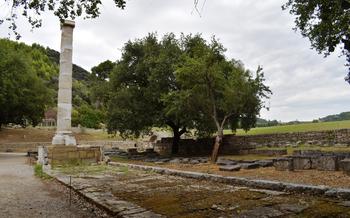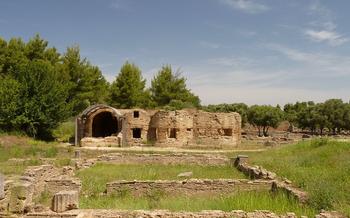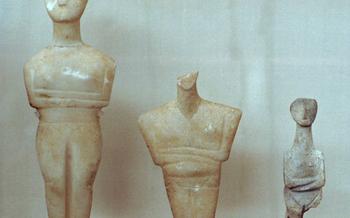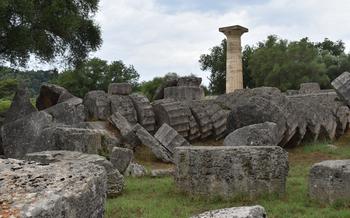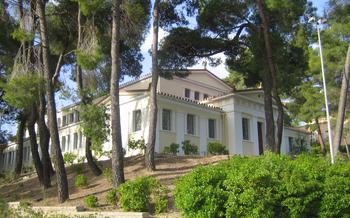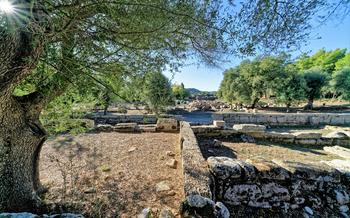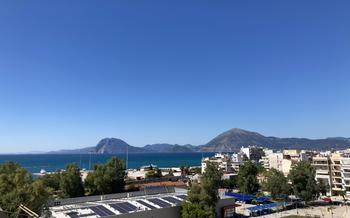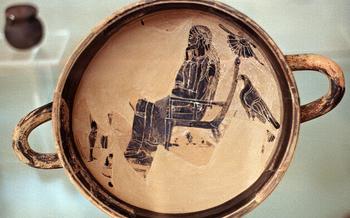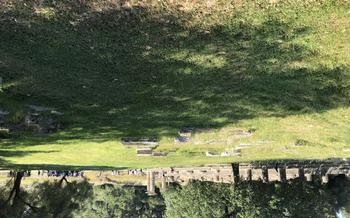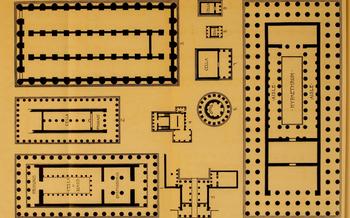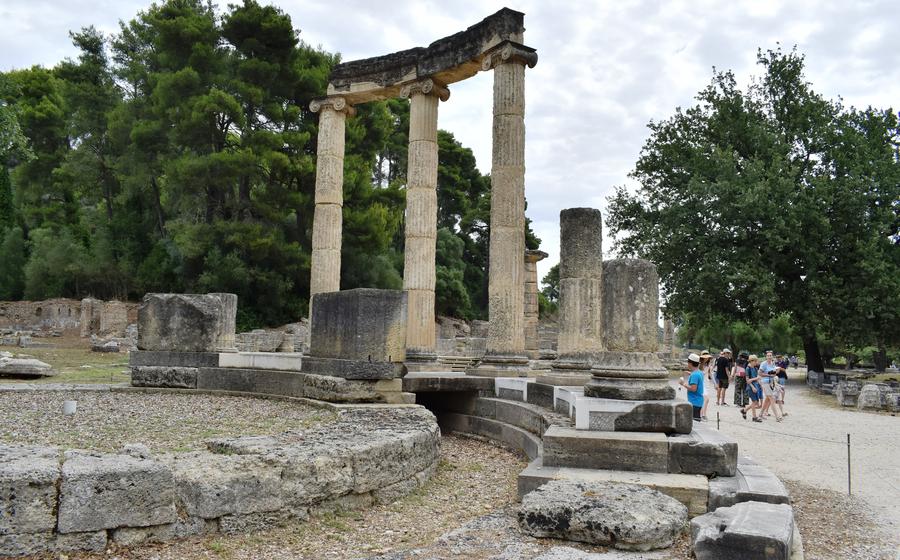
Philippeion
- Historical Significance
- Location and Accessibility
- Historical Context
- Visiting the Philippeion
- Things to Do Nearby
- Planning Your Visit
- Best Time to Visit
- Dress Code
- Facilities and Amenities
- Accessibility for Visitors with Disabilities
- Local Cuisine and Dining
- Accommodation Options
- Cultural Events and Festivals
- Shopping and Souvenirs
- Safety and Security
- Responsible Tourism
- Travel Tips and Hacks
Historical Significance
The Philippeion stands as a testament to the rich history and cultural heritage of ancient Greece. Constructed in the 4th century BC during the reign of Philip II of Macedon, the Philippeion holds a significant place in the annals of antiquity. It was commissioned to commemorate the Macedonian victory at the Battle of Chaeronea, a pivotal event that marked the rise of Macedonian power and the beginning of the Hellenistic period.
The Philippeion's unique circular design, a departure from the traditional rectangular temples of the time, reflects the influence of new architectural ideas and styles emerging during this period. Its circular tholos, or rotunda, is a testament to the innovative spirit of ancient Greek architects. The use of the Corinthian order, with its intricate capitals adorned with acanthus leaves, further exemplifies the evolving architectural tastes of the era.
The Philippeion's historical significance is intertwined with the ancient Olympic Games, held every four years in nearby Olympia. The structure served as a commemorative monument to honor the Macedonian victories in these prestigious athletic competitions. It stood as a symbol of Philip II's patronage of the Games and his desire to associate his name with the grandeur and prestige of this pan-Hellenic event.
Location and Accessibility
The Philippeion is situated within the Olympia Archaeological Site, a sprawling complex that houses numerous ancient ruins and landmarks. Its proximity to other notable attractions, such as the Temple of Zeus and the Ancient Stadium, makes it an ideal destination for history and culture enthusiasts.
Public Transportation:
Olympia is well-connected by public transportation, making it convenient for visitors to reach the archaeological site. Buses and trains offer regular service to Olympia from major cities like Athens and Patras. Once in Olympia, visitors can take a short walk or catch a local bus to the archaeological site.
Driving Directions:
For those who prefer to explore Olympia by car, detailed driving directions are available online. From Athens, take the A7 motorway towards Peloponnese and exit at Olympia. Follow signs to the archaeological site, which is about 10 kilometers from the motorway exit.
Parking Availability:
Ample parking space is available near the Olympia Archaeological Site, ensuring that visitors can conveniently park their vehicles. Designated parking areas are located within walking distance of the Philippeion, making it easy for visitors to access the ancient monument.
Historical Context
The Philippeion holds immense historical significance as it was commissioned by Philip II of Macedon, the father of Alexander the Great, to commemorate the victory of his chariot team in the ancient Olympic Games. Constructed around 338 BC, the Philippeion served as a testament to Philip II's power and influence in the Greek world. However, its primary purpose was to honor the achievements of the Macedonian royal family and their association with the prestigious Olympic Games.
The Philippeion stood as a symbol of Macedonian dominance and their integration into the prestigious world of Greek athletics and culture. It reflected Philip II's ambition to unite Greece under his rule and his desire to be recognized as a legitimate heir to the Greek legacy. The monument's construction during the Peloponnesian Games, a major religious and athletic festival held every four years, further emphasized its connection to the ancient Olympic tradition.
Despite its historical significance, the Philippeion suffered a tumultuous fate. In the 4th century AD, it was severely damaged by an earthquake and fell into ruin. Over time, the site was buried under layers of sediment and vegetation, obscuring its grandeur from the world. It wasn't until the late 19th century that German archaeologists, led by Ernst Curtius, unearthed the remains of the Philippeion during excavations at Olympia.
The rediscovery of the Philippeion shed light on this important chapter of Greek history and provided valuable insights into the architectural and artistic achievements of the ancient Macedonians. Today, the monument stands as a testament to their legacy, inviting visitors to explore its rich history and admire its architectural splendor.
Visiting the Philippeion
The Philippeion is open to the public daily, allowing visitors to explore this architectural marvel at their leisure. Opening hours may vary depending on the season, so it's advisable to check the official website or inquire locally for the most up-to-date information.
Admission fees are typically charged for entry to the archaeological site, which includes access to the Philippeion and other ancient landmarks. Reduced rates or concessions may be available for students, seniors, and families, so be sure to inquire about discounts when purchasing tickets.
If you're looking for a deeper understanding of the Philippeion's history and significance, guided tours are available. These tours are led by knowledgeable guides who can provide insights into the monument's architecture, historical context, and mythological associations. Guided tours can be arranged in advance or on-site, depending on availability.
Photography is permitted within the archaeological site, but it's essential to be respectful of other visitors and the monument itself. Avoid using flash photography, as this can damage the delicate artwork and sculptures. Tripods and selfie sticks are generally not allowed, as they can obstruct the flow of visitors and cause safety hazards.
Things to Do Nearby
Olympia is a treasure trove of ancient wonders, and exploring the vicinity of the Philippeion reveals even more captivating sites. A short walk away, the majestic Temple of Zeus stands as a testament to the architectural prowess of ancient Greece. Once one of the Seven Wonders of the Ancient World, this colossal temple is a breathtaking sight, its towering columns reaching towards the sky.
Just a stone's throw from the Philippeion, the Archaeological Museum of Olympia houses a wealth of artifacts unearthed from the ancient Olympic Games. From intricate sculptures to ceremonial objects, the museum's collection offers a glimpse into the rich history and traditions of the games.
To experience the birthplace of the Olympics, a visit to the Ancient Stadium is a must. Imagine the roar of the crowd as ancient athletes competed on this very ground, their feats of strength and agility echoing through the centuries.
For a deeper understanding of the Olympic Games' legacy, the Museum of the History of the Olympic Games provides a comprehensive exploration of their evolution from ancient times to the modern era. Interactive exhibits and historical displays bring the stories of legendary athletes and unforgettable moments to life.
Planning Your Visit
Best Time to Visit
The ideal time to visit Olympia is during the shoulder seasons, namely spring (April-May) and autumn (September-October). During these periods, the weather is pleasant, with warm and sunny days and cool nights. The crowds are also smaller, allowing you to explore the archaeological site and its surroundings more peacefully.
In the summer months, temperatures in Olympia can soar, making it uncomfortable to walk around and explore the outdoor ruins. Additionally, the site can get crowded with tourists, which can detract from the overall experience.
Dress Code
When visiting religious and historical sites in Greece, it is important to dress respectfully. This means avoiding shorts, tank tops, and other revealing clothing. Instead, opt for lightweight, loose-fitting clothing that covers your shoulders and knees.
Facilities and Amenities
The archaeological site of Olympia offers a range of facilities and amenities to enhance your visit. Restrooms and drinking fountains are available at various points throughout the site, and there is a small cafe where you can purchase snacks and drinks.
A gift shop is also located on-site, where you can find souvenirs, books, and other items related to the ancient Olympic Games and the history of Olympia.
Accessibility for Visitors with Disabilities
Olympia is committed to providing an accessible and inclusive experience for all visitors. The archaeological site features ramps and designated pathways that allow visitors with disabilities to navigate the grounds easily.
Wheelchairs are also available for rent at the site's entrance. If you require any assistance or have specific accessibility needs, please contact the site's staff, who will be happy to help.
Local Cuisine and Dining
Olympia offers a culinary journey that tantalizes the taste buds with traditional Greek dishes, each bursting with fresh, local ingredients and aromatic herbs. Tavernas and restaurants nestled around the archaeological site invite visitors to savor authentic Greek cuisine amidst a warm and welcoming atmosphere. From hearty stews and grilled meats to fresh seafood and crisp salads, the culinary delights of Olympia are sure to satisfy every palate.
For a truly immersive experience, venture beyond the main tourist areas and seek out hidden gems where locals gather. Street food stalls and local delicacies offer a taste of the region's culinary heritage, from mouthwatering souvlaki skewers to flaky pastries filled with savory fillings.
If you prefer a leisurely picnic, head to one of the many picturesque spots surrounding the archaeological site. Spread out a blanket, unpack your basket filled with local cheeses, olives, fresh bread, and seasonal fruits, and savor the flavors of Greece while basking in the beauty of your surroundings.
Accommodation Options
Olympia offers a diverse range of accommodation options to suit different budgets and preferences. Whether you seek luxurious comfort or affordable simplicity, you'll find suitable lodging options near the archaeological site.
Hotels and Resorts: For a lavish and comfortable stay, consider booking a room at one of Olympia's upscale hotels or resorts. These establishments offer amenities such as swimming pools, fitness centers, and fine dining restaurants, ensuring a relaxing and indulgent experience.
Budget Accommodations: If you're traveling on a tight budget, several hostels and guesthouses provide basic yet clean and comfortable accommodations. These options are ideal for budget-conscious travelers and backpackers seeking a social and vibrant atmosphere.
Apartments and Villas: For those seeking a home away from home, self-catering apartments and villas offer a convenient and spacious option. These accommodations are fully equipped with kitchens and living areas, allowing you to prepare meals and enjoy the flexibility of a private residence.
Camping Facilities: For a more adventurous and immersive experience, consider camping near the archaeological site. Several campgrounds offer designated camping areas, providing a unique opportunity to connect with nature while exploring ancient Olympia.
Insider Tip: For a truly authentic experience, consider staying at a traditional Greek guesthouse or family-run hotel. These establishments often offer warm hospitality, local insights, and delicious homemade Greek cuisine.
Cultural Events and Festivals
Olympia is not only a place of historical significance but also a hub of cultural events and festivals that celebrate the rich heritage of Greece. The most prominent of these is the annual Ancient Olympia Festival, a spectacular event that brings the ancient Olympic Games back to life. Held every four years, the festival features athletic competitions, theatrical performances, traditional music and dance, and educational workshops, providing a glimpse into the culture and traditions of ancient Greece.
Throughout the year, Olympia hosts various local celebrations and events that showcase the region's unique customs and traditions. Visitors can experience traditional Greek music and dance performances, art exhibitions featuring local artists, and religious festivals that honor the patron saints of the area.
For those interested in sports, Olympia offers the opportunity to participate in a variety of sporting events, including running races, cycling competitions, and swimming tournaments. These events provide a chance to not only engage in physical activities but also interact with the local community and learn about their passion for sports.
Shopping and Souvenirs
Olympia offers a delightful array of shopping opportunities for visitors seeking unique mementos of their visit. From traditional handicrafts to local delicacies, there's something for every taste and budget.
Local Handicrafts:
- Peruse the charming shops in the town of Olympia to discover an array of locally crafted goods, including intricate pottery, handwoven textiles, and intricate jewelry.
- Don't miss the opportunity to witness skilled artisans at work, demonstrating their traditional techniques and creating one-of-a-kind pieces that reflect the rich cultural heritage of the region.
Olive Oil and Honey:
- Olympia is renowned for its production of high-quality olive oil and honey. Take advantage of the opportunity to purchase these delectable products directly from local producers, ensuring their authenticity and freshness.
- Visit local farms or specialty shops to sample and select from a variety of olive oils, ranging from mild and fruity to robust and peppery.
- Indulge in the sweet flavors of local honey, crafted by skilled beekeepers using traditional methods.
Sports Memorabilia:
- For sports enthusiasts, Olympia offers a range of sports-related souvenirs, paying homage to the Olympic Games' illustrious history.
- Discover shops selling replicas of ancient Olympic medals, commemorative jerseys, and other memorabilia that celebrate the spirit of athleticism and competition.
Unique Gifts:
- Seek out unique and authentic gifts that capture the essence of Olympia. Consider purchasing replicas of ancient Greek artifacts, such as pottery, sculptures, or coins, as a tangible reminder of your visit.
- Explore the local art galleries to find original paintings, sculptures, and ceramics created by talented local artists, showcasing the vibrant contemporary art scene in Olympia.
Safety and Security
Olympia is generally a safe and welcoming destination for tourists. However, like any popular tourist spot, it's essential to be aware of your surroundings and take necessary precautions. Here are some safety tips to keep in mind:
- General Safety Tips:
- Be vigilant and aware of your surroundings, especially in crowded areas.
- Keep your valuables close and secure, such as your passport, wallet, and phone.
- Avoid carrying large amounts of cash. Use credit cards or traveler's checks whenever possible.
- Be cautious of pickpockets and petty theft, especially in crowded tourist areas.
- Stay alert and avoid walking alone at night, particularly in isolated areas.
-
If you need assistance or have any concerns, don't hesitate to approach local authorities or hotel staff.
-
Emergency Numbers:
- In case of an emergency, dial 112, the general emergency number in Greece.
-
You can also contact the local police station at +30 26210 2222
-
Avoiding Tourist Scams:
- Be wary of individuals offering unsolicited services or products, such as fake tour guides or souvenir sellers.
- Always negotiate prices before purchasing goods or services, and be prepared to walk away if the price seems too high.
-
Avoid exchanging currency on the street, as there's a higher risk of being scammed. Use authorized currency exchange offices or banks.
-
Solo Traveler Safety:
- Solo travelers should be extra vigilant and take necessary precautions to stay safe.
- Avoid walking alone at night, especially in isolated areas.
- Let someone know your travel plans and check in with them regularly.
- Consider joining group tours or activities to meet other travelers and explore the area safely.
Responsible Tourism
As you explore the Philippeion and the surrounding archaeological site, it's important to practice responsible tourism to preserve this historical treasure for future generations. Here are some guidelines to follow:
-
Respect the Site: Be respectful of the site's significance and avoid touching or climbing on the ancient structures. Follow designated pathways and stay within marked areas to prevent damage to the ruins.
-
Sustainable Practices: Choose sustainable transportation options like walking, cycling, or using public transport to minimize your carbon footprint. Bring reusable water bottles and avoid single-use plastics to reduce waste.
-
Support Local Businesses: Contribute to the local economy by patronizing local businesses, such as restaurants, cafes, and souvenir shops. This helps preserve traditional crafts and supports the livelihoods of the local community.
-
Environmental Conservation: Be mindful of your impact on the environment. Dispose of waste properly in designated bins and avoid littering. Respect the natural surroundings by not disturbing wildlife or picking flowers and plants.
Travel Tips and Hacks
Packing Essentials: For a comfortable and hassle-free visit to Olympia, consider packing comfortable walking shoes, a hat for sun protection, and a reusable water bottle. Sunblock, sunglasses, and a light jacket for cooler evenings are also recommended.
Currency and Exchange: The official currency of Greece is the Euro. Currency exchange services are available at the airport, banks, and exchange bureaus throughout Olympia. It's advisable to exchange your currency before arriving in Greece or use a credit card with low foreign transaction fees.
Learning Basic Greek Phrases: Learning a few basic Greek phrases can enhance your interactions with locals and help you navigate the area. Greetings like "kalimera" (good morning) and "kalispera" (good evening) are a good start. "Efharisto" (thank you) and "parakalo" (please) are also useful.
Staying Connected: Olympia has good mobile network coverage, allowing you to stay connected with your devices. Free Wi-Fi is available at some restaurants, cafes, and hotels. Consider purchasing a local SIM card for more affordable data and call rates if you plan on using your phone extensively.
